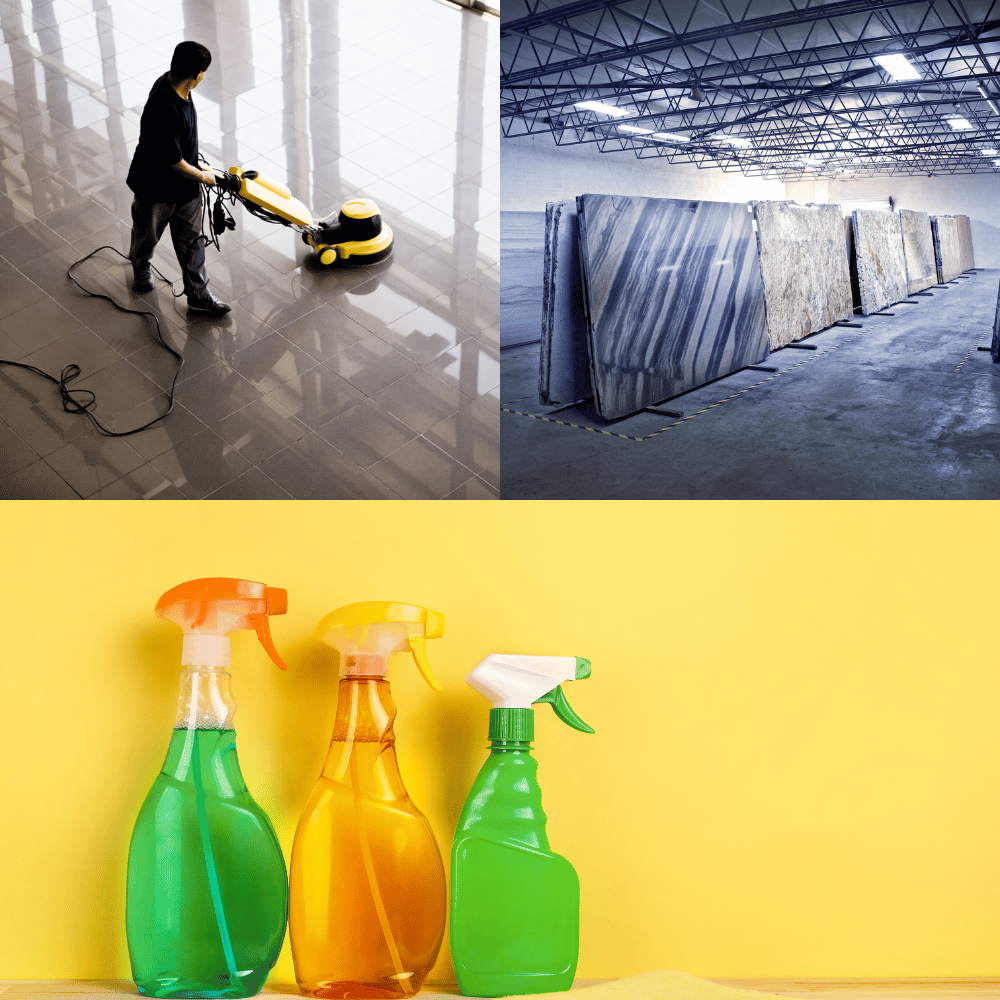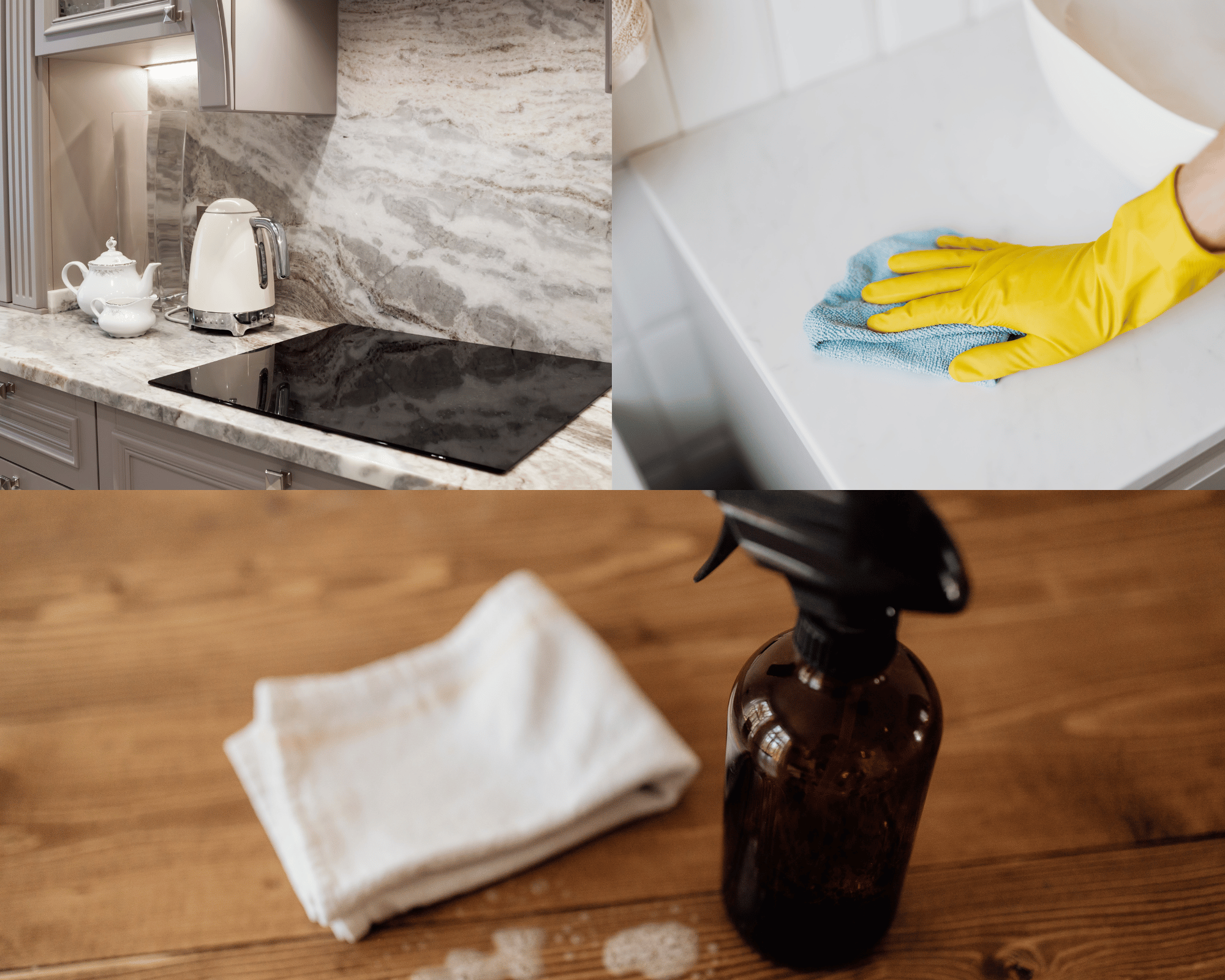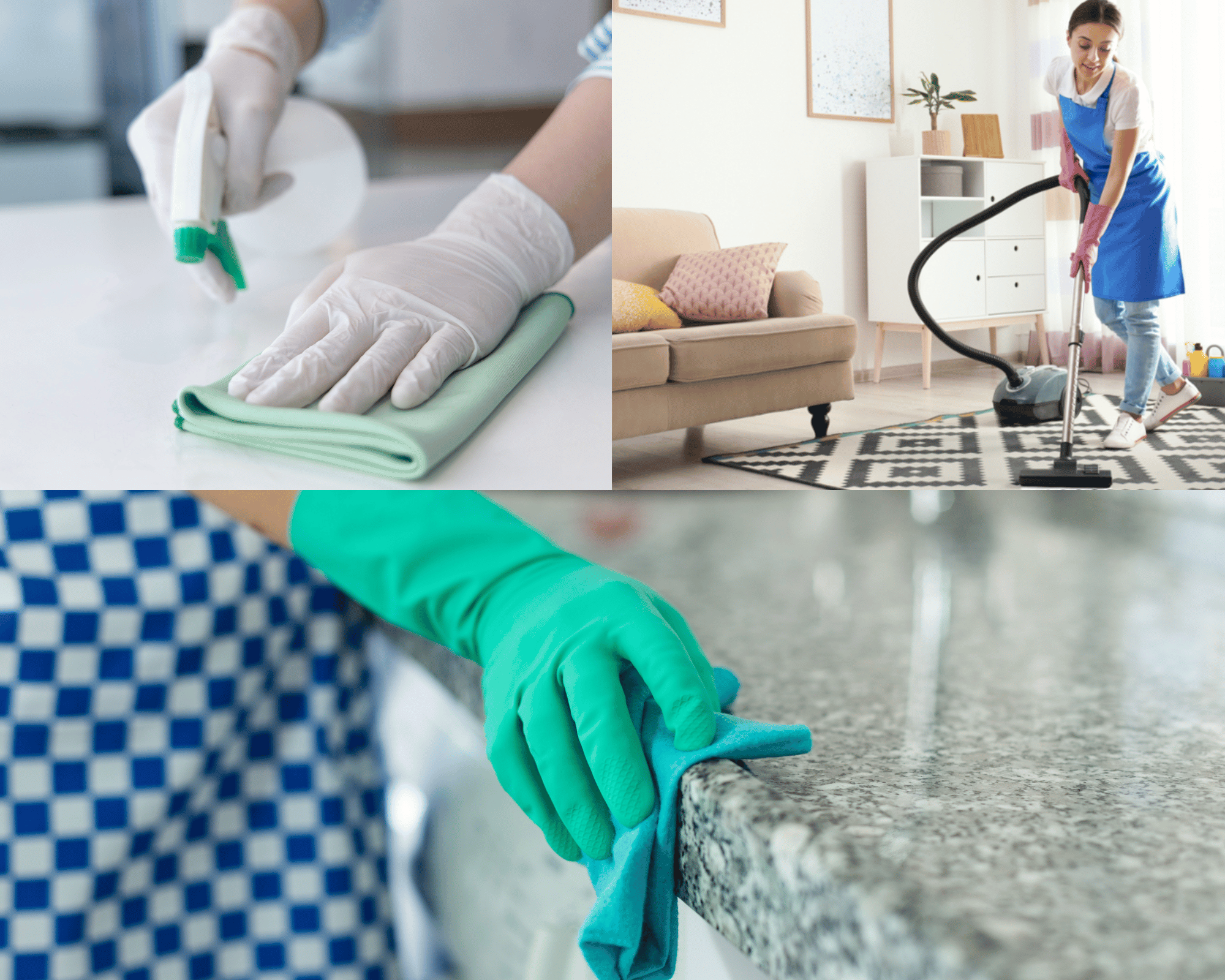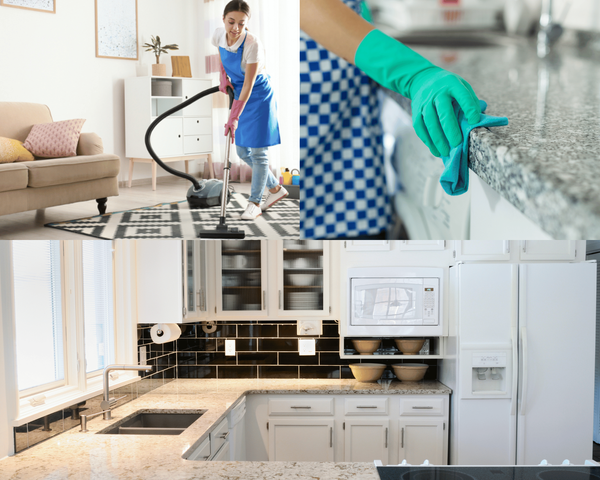Quartz countertops are the crown jewels of modern kitchens, offering both elegance and durability. However, maintaining clean quartz countertops requires more than just a quick wipe-down. Using mild soap and water is essential for routine cleaning to avoid damaging the surface. In this guide, we’ll explore the best cleaning methods for quartz, how to clean quartz effectively, and common mistakes to avoid when cleaning quartz.
Key Takeaways:
- Effective Cleaning: Use gentle, non-abrasive cleaners to maintain the shine and integrity of quartz countertops.
- Avoid Common Mistakes: Steer clear of harsh chemicals and abrasive tools that can damage the surface.
- Regular Maintenance: Maintaining quartz countertops involves consistent cleaning routines, such as using microfiber cloths and proper cleaning techniques, to prevent stains and prolong their life.
Understanding Quartz Countertops
Quartz countertops are engineered stone surfaces made from a blend of natural quartz crystals and resin. This combination results in a non-porous, stain-resistant surface that is both beautiful and practical. Unlike natural stone, quartz does not require sealing, making it a popular choice for busy households. However, its non-porous nature means that certain cleaning techniques are more effective than others. New quartz countertops are not only beautiful but also low-maintenance, offering long-lasting appeal with minimal upkeep.
When considering how to clean quartz effectively, it’s essential to understand its composition. The resin used in quartz countertops can be sensitive to high heat and harsh chemicals. Therefore, using the right cleaning products and methods is crucial to maintaining their appearance. A gentle approach ensures that the surface remains scratch-free and retains its glossy finish.
Essential Cleaning Tools and Products for Cleaning Quartz Countertops
When it comes to cleaning quartz countertops, having the right tools and products is crucial. Here are some essentials to keep your quartz surfaces looking their best:
- Soft Cloths: Microfiber cloths are ideal for cleaning quartz countertops as they are gentle and won’t scratch the surface. They effectively pick up dust and grime without leaving streaks.
- Mild Dish Soap: A mild dish soap is a gentle and effective cleaner for quartz countertops. Look for a soap that is pH-neutral and free of harsh chemicals to avoid damaging the resin in the quartz.
- Warm Water: Warm water is the best temperature for cleaning quartz countertops. It helps to dissolve dirt and grime without causing thermal shock to the surface.
- Gentle Cleanser: For a deeper clean, use a gentle cleanser specifically designed for quartz surfaces. These products are formulated to clean effectively without using abrasive cleaners or harsh chemicals.
- Microfiber Sponges: Microfiber sponges are gentle and effective for cleaning quartz countertops. They are also lint-free, ensuring that no annoying bits of fabric are left behind.
By using these tools and products, you can maintain the beauty and integrity of your quartz countertops with ease.
Best Cleaning Methods for Quartz
The best way to clean quartz involves using mild dish soap and warm water. This simple solution is effective for everyday cleaning and helps maintain the countertop’s shine. To clean, mix a few drops of dish soap with warm water in a spray bottle. Spray the solution onto the countertop and wipe it down with a soft cloth or sponge. This method removes dirt and grime without damaging the surface.
For tougher quartz countertop stains, a paste made from baking soda and water can be applied. Gently rub the paste onto the stain using a soft cloth, then rinse with warm water. Avoid using abrasive pads or harsh chemicals, as these can scratch or dull the surface. Regular cleaning with these gentle methods will keep your quartz countertops looking their best.
Deep Cleaning Quartz
While regular cleaning is essential for maintaining the appearance of your quartz countertops, occasionally, a deep cleaning session is necessary to remove stubborn stains or built-up residue. Here’s a step-by-step guide on how to deep clean your quartz countertops:
- Prepare the Cleaning Solution: Mix a solution of warm water and mild dish soap. This combination is effective for breaking down grime without harming the quartz surface.
- Wipe Down the Surface: Dip a soft cloth into the solution and wring it out thoroughly. Wipe down the entire surface of the quartz countertop, working in circular motions to lift dirt and stains.
- Use a Gentle Cleanser: If you need a deeper clean, apply a gentle cleanser specifically designed for quartz surfaces. Follow the product instructions for the best results.
- Rinse Thoroughly: Rinse the cloth thoroughly and wipe down the surface again to remove any residual cleaner. This step ensures that no soap or cleanser is left behind, which could dull the surface over time.
- Dry the Surface: Dry the surface with a microfiber cloth to prevent water spots. A dry, streak-free finish will keep your quartz countertops looking pristine.
By following these steps, you can effectively deep clean your quartz countertops and keep them looking their best.
Safety Measures for Quartz Countertop Care
When it comes to cleaning and maintaining your quartz countertops, safety should always be your top priority. Here are some safety measures to keep in mind:
- Avoid Harsh Chemicals: Steer clear of using harsh chemicals or abrasive cleaners, as they can damage the surface of your quartz countertops. Products containing bleach or ammonia should be avoided at all costs.
- Use Gentle Tools: Never use abrasive sponges or scrubbers, as they can scratch the surface. Stick to soft cloths and microfiber sponges for cleaning.
- Wear Gloves: Always wear gloves when cleaning your quartz countertops to protect your hands from any cleaning agents, even those that are mild.
- Ensure Proper Ventilation: Make sure the area is well-ventilated when cleaning your quartz countertops to prevent inhaling any fumes from the cleaning products.
By following these safety measures, you can protect both your quartz countertops and your health.
Protecting Your Quartz Countertop
Protecting your quartz countertop is essential to maintaining its appearance and longevity. Here are some tips on how to protect your quartz countertop:
- Use a Cutting Board: When preparing food, always use a cutting board to prevent scratches and stains on your quartz countertop. This simple step can save your surface from unnecessary damage.
- Avoid Direct Heat: Never place hot objects directly on the surface of your quartz countertop, as it can damage the resin. Use a trivet or mat to protect the surface from heat damage.
- Clean Spills Immediately: Regularly clean up spills and stains to prevent them from setting. Acidic substances like lemon juice or vinegar can etch the surface if left unattended.
- Avoid Abrasive Cleaners: Stick to gentle, non-abrasive cleaners to maintain the integrity of your quartz countertop. Harsh chemicals can break down the resin and dull the surface over time.
By taking these protective measures, you can ensure that your quartz countertops remain a stunning and durable feature in your kitchen for years to come.
Mistakes to Avoid When Cleaning Quartz
One of the most common mistakes to avoid when cleaning quartz is using harsh chemicals like bleach or ammonia. These substances can break down the resin in quartz, leading to discoloration or damage. Instead, opt for pH-balanced cleaners specifically designed for quartz surfaces. These products are formulated to clean effectively without harming the countertop. Tackling tough stains like coffee or red wine requires immediate action and the use of appropriate products to maintain the countertop's appearance and longevity.
Another mistake is using abrasive cleaning tools such as steel wool or scouring pads. These can scratch the surface, leaving unsightly marks. Always use soft cloths or sponges for cleaning. Additionally, avoid placing hot pots or pans directly on the countertop, as extreme heat can cause the resin to warp or discolor. Using trivets or heat pads can prevent this type of damage.
Regular Maintenance Tips for Maintaining Quartz Countertops
Regular maintenance is key to preserving the beauty of quartz counters. Wipe up spills immediately to prevent staining, especially from acidic substances like lemon juice or vinegar. These can etch the surface if left unattended. A quick wipe with a damp cloth is usually sufficient to remove spills before they set.
Incorporating a weekly cleaning routine can also help maintain the countertop’s appearance. Use a gentle cleaner and a soft cloth to wipe down the surface, paying special attention to areas around the sink and stove where grime tends to accumulate. By staying on top of regular maintenance, you can ensure your quartz countertops remain a stunning focal point in your kitchen. Compared to stone countertops, quartz countertops are non-porous and require less intensive maintenance, making them a practical and durable choice.
Summary
Quartz countertops are a beautiful and durable addition to any kitchen, but they require proper care to maintain their appearance. By using gentle cleaning methods and avoiding common mistakes, you can keep your countertops looking pristine for years to come. Regular maintenance and the right cleaning products are essential to preserving the beauty and functionality of quartz surfaces.
FAQ
Q1: Can I use vinegar to clean my quartz countertops?
A1: It's best to avoid using vinegar on quartz countertops. Vinegar is acidic and can etch the surface over time. Instead, use a pH-balanced cleaner specifically designed for quartz.
Q2: What should I do if I accidentally use a harsh cleaner on my quartz countertop?
A2: If a harsh cleaner is used, rinse the area immediately with plenty of water to remove any residue. Follow up with a gentle cleaner and a soft cloth to restore the surface.
Q3: How often should I clean my quartz countertops?
A3: For best results, clean your quartz countertops daily with a mild dish soap and water solution. For deeper cleaning, aim for once a week using a pH-balanced cleaner.











